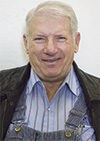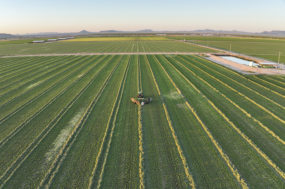We arrived in time to unload and then were invited in for supper, which was followed by an offer of a warm place to spend the night.
We gladly accepted both offers. The sound of an engine running was with us all night. It was similar to the sound made by a two-cylinder John Deere tractor, yet different.
Between getting up and having breakfast at the Howard Ranch, I sent Dan outside to find the tractor that someone had left on all night and turn it off. He returned a few minutes later. I asked him if he found the tractor. He said that it was not a tractor and that he did not know what it was.
What he had found was the ranch power plant. It was a single-cylinder, diesel engine turning a generator. The engine was a Witte, made in England, and had an exposed flywheel about four inches thick and about three and a half feet in diameter.
It appeared to be operating at about 700 revolutions per minute. The single cylinder was horizontal and was liquid-cooled.
Rowland and the Howard Ranch were about a hundred miles from a power line, so they were dependent on the old Witte to keep the lights lit and the refrigerators cool.
Kent Howard said that the sound of the engine running was bothersome to some guests at the ranch, but that he slept like a baby to the sound. Should it ever stop, Kent went on, he would sit up in bed instantly wide-awake due to the absence of the familiar “pop-pop-pop-pop” of the old engine.
He said that he once slept through the engine stopping in 20-below weather. When he did wake up, he and the crew made a mad dash to the generator shed to see what the problem was.
They built a fire under the engine, warmed it enough to drain the oil out of the crankcase, and then heated the oil over a fire.
After changing the fuel filter and getting enough of the diesel fuel un-gelled so that the motor might start, they poured the scalding hot, lubricating oil back in the crankcase, opened the compression release, spun the Witte over, then closed the compression release, and to their amazement, it started and ran as though nothing had happened.
And yes, there was a complete spare generator and engine sitting idle in the same shed.
One night we spent a good hour and a half on top of a windy hill north of Mountain Home, Idaho. Leo’s truck had sprung an air leak, and between his junk box and mine, we finally got him patched up so we could at least get out of the wind.
Lyle complained that even with all the heaters in the Freightliner running wide open, it was still below 32ºF inside the cab.
I asked him to remember for a minute the time the previous summer that we unloaded between two other haystacks, which blocked any chance of a breeze, the humidity was about 101 percent and it was about 99ºF. We were both wringing wet with sweat and still having heat stroke/heat exhaustion feelings. Lyle told me that that was then, and this was now.
About that time, Leo’s helper came shivering up to the door and asked if I had a good “O” ring about the size of the pieces of one he had in his hand. I did not, but I gave him some black electrical tape and a tube of silicone along with a couple of other strange pieces I found in my junk box.
As he went to leave, I told him to tell Leo that he was more trouble than a pregnant woman and nowhere near as productive. I don’t know which of the pieces Leo used to stop the air leak in his gearshift system, but he eventually called on the C.B. radio that he was ready to go now.
I asked Leo later if his helper had relayed the message as to his relative productivity. He had not. Leo could not imagine why he had not relayed such a simple message. I don’t suppose that the temperature inside the cab of Leo’s truck being about 80ºF had anything to do with it, do you? FG











